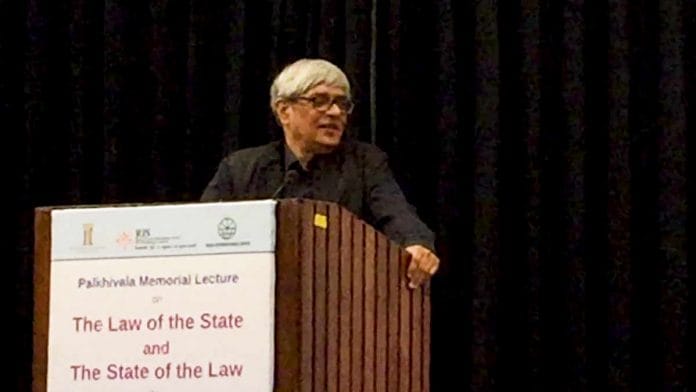It is difficult to know where to begin and where to end when considering Bibek Debroy. Let me start by saying that the principal reason I subscribe to Mint is to read his funny, lovable limericks every morning. I might just cancel my subscription now!
Debroy was a distinguished economist who maintained the fine balance needed to keep one’s neo-classical roots while also embracing many eclectic paradigms. At heart, he was a proper political economist in the Smithian tradition of the Scottish Enlightenment. He was always concerned not only with what is “correct” based on the calculus of differences but also with what is possible given the constraints of human preferences and what would pass the moral smell test. He never advocated courses of action that might be theoretically sound but would not withstand practical political reality. Add to this the need to pass through the gates of moral ambiguity monitored by Smith’s “impartial spectator”. What we got was an economist who was a man for all seasons.
When he moved from economics to the world of classical Sanskrit texts, he was transformed. Suddenly, we were face to face with a true “Acharya”, one who was both a “Gyanavan” and a “Gyani”. For years, I would stare lovingly at the volumes of Bhandarkar’s massive definitive edition of the Mahabharata, knowing full well that my Sanskrit was simply not good enough to even glance at them, let alone read and absorb them. We had to content ourselves with Rajagopalachari’s abridged version. And then came Debroy, like a whirlwind. He put us all out of our agony by producing, in finely crafted, limpid English, every one of the mighty Parvas of the great epic. I bought the volumes as they came out and eventually acquired the elegant boxed edition of all of them.
We have all grown up with the Mahabharata. The burning of the House of Lac, the death of Kichaka, the questions of the Yaksha, the words of wisdom from the dying Bhishma—we know about all of these. But quite candidly, virtually none of us have taken a complete and comprehensive journey through this entire “feast of the divine Vyasa” before. We should all be eternally grateful to Debroy for making this possible. What adds to the beauty of the experience is that Debroy’s command and serene control of the English language are just superb. Perhaps he was inspired by Ganesha himself to find an echo of Vyasa’s sonorous Sanskrit!
Bibek Debroy, more than an economist
Debroy would have been one of the greats of modern India if he had been only an economist or only a Sanskritist. But he was much more. He found the time and energy to write journalistic columns on contemporary issues as well as book reviews. His book reviews were classics of scholarship. He reviewed one of my books, spending time analysing my admiration for Bankim, and ended up paying a scholarly tribute to him. More importantly, with astounding brilliance, he demolished Rousseau’s liberalism and supported my position on the glories of conservatism. I could not have done a better job.
Many of his columns will continue to be cherished. One hopes a collection of them will be published soon. I was thinking of a recent column he co-authored with Sanjiv Sanyal and another contributor. They pointed out the dangers of the seductive ideas sold to us by self-appointed foreign experts who may have their own agendas and biases. In the 1950s, Nehru was enamoured of the Ford Foundation and the Rockefeller Foundation. It is not at all clear that their advice helped India’s economy; it might have harmed us. Their excessive focus on population control may have resulted in intended and unintended consequences that have been both perverse and morally questionable.
Today, we have dozens of sundry foundations setting up shop in Delhi, telling us in a schoolmasterly fashion what we should be doing. Debroy and his colleagues have sounded a timely warning to us to be careful of Greeks bearing gifts!
While we can welcome foreign scholarship, we must also stay connected to the soil and stubble of India. Debroy was a master of English prose. He was also rooted in his native Bengal, in the larger landscape of India, and, above all, in that sacred land between the Saraswati and the Drishadvati. He will go down in the intellectual history of our country as an “Acharya”. In the centuries to come, his Mahabharata will attain the importance we attach to the texts of Shankara, Ramanuja, and Madhvacharya.
In the Mahabharata, Yudhishthira tells the Yaksha: “Nityam Gacchanti Sahasrani Yamalayaha”; “Every day, thousands go to the abode of Yama.” Today, one of our nation’s jewels has entered that abode. Yama, please accept him as your honoured guest. Think of him as a combination of Nachiketa and Abhimanyu. Give him the honoured place he deserves. We who are left behind are bereft and the losers.
Jaithirth ‘Jerry’ Rao is a retired entrepreneur who lives in Lonavala. He has published three books: ‘Notes from an Indian Conservative’, ‘The Indian Conservative’, and ‘Economist Gandhi’. Views are personal.
(Edited by Prashant)






